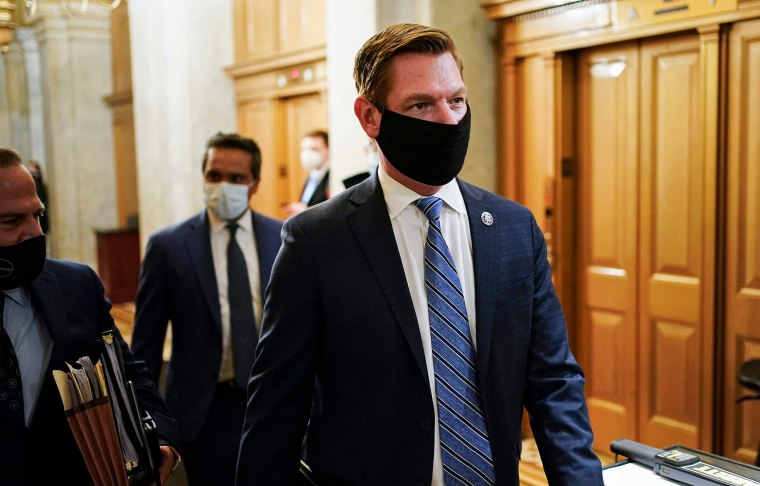When Democratic congressman Eric Swalwell filed a suit against former president Donald Trump on Friday, he took a smart approach. Namely, Swalwell’s suit is broader, and therefore would appear more winnable, than one that merely asserts that Trump incited the attacks on the Capitol.
A smart winning strategy does not always translate into a winning one.
But a smart winning strategy does not always translate into a winning one. There are still plenty of legal hurdles for Swalwell to conquer to succeed on his suit. The complaint contains more than 40 pages of damning factual allegations against Trump, much of it similar to the arguments we heard during the impeachment trial. The complaint also includes allegations against Trump’s former attorney Rudy Giuliani, his son Donald Trump Jr. and GOP Rep. Mo Brooks.
Swalwell, one of the impeachment managers in Trump’s second impeachment trial, is one of two members of Congress who’ve brought cases against the former president in the past months. In February, Congressman Bennie Thompson, D-Miss., and the NAACP sued Trump and Giuliani for conspiring with the Proud Boys and the Oath Keepers to violate civil rights by blocking the counting of electoral college votes.
In Swalwell’s suit, more than half of the nine causes of action the congressman sued under relate to negligence. This is significant because under a negligence standard, Swalwell will have to prove something less than that the defendants intended for the Capitol riots to occur.
Trump’s main defenses here, probably similar to his likely defenses in the Thompson case, will likely be the freedom of speech under the First Amendment and that he is protected from liability because he took all of the actions alleged in the complaint while he was president.
As with so many suits against Trump, a “win” for either of these suits may be to survive long enough to take Trump’s deposition and obtain discovery.
It is true that people enjoy broad First Amendment protection to engage in speech, particularly political speech, and very certainly even impassioned and nasty speech. But that protection is not unlimited. And given the allegations contained in both complaints, it is difficult to see how the actions Trump engaged in could fall within his official duties and responsibilities as president.
But as with so many suits against Trump, a “win” for either of these suits may be to survive long enough to take Trump’s deposition and obtain discovery. This could bring new evidence — potentially damning evidence — to light.
No matter what happens in these two suits, it bears repeating that they are brought by two Democrats, and joined by no Republicans. Once again, a question of where we stand on the law seems to boil down to a question of partisan affiliation.
One of the many sad lessons of the last four years is that partisan affiliation, more than ideology, more than facts, more than legal analysis — frankly, more than anything — will likely dictate our views and conclusions on the most pressing issues of the day.
Think about your view of whether or not the government should mandate mask wearing. Think about your view of the Capitol riots on Jan. 6. Some of us naively believed that when an angry mob stormed the Capitol, putting our elected officials and their staff in danger, and causing death and destruction, that this would be the thing that broke the proverbial camel’s back.
We believed this would be the moment that led to bipartisan condemnation of Trump and many of his supporters. We were encouraged of this belief when Republican Senate Minority Leader Mitch McConnell wrote in the Wall Street Journal that “there is no question former President Trump bears moral responsibility. His supporters stormed the Capitol because of the unhinged falsehoods he shouted into the world’s largest megaphone.”
These two sentences were of course followed by a huge caveat; McConnell penned these words to defend his decision to vote to acquit Trump in his second impeachment trial. On the floor of the Senate, he stated, “President Trump is still liable for everything he did while he was in office as an ordinary citizen,” making the argument that an impeachment was simply not the proper venue to hold Trump accountable.
Now, two members of Congress have entered that proper venue — a courthouse — to hold Trump accountable. While we do not know what the outcome of the case will be, we do know that yet again it has pitted Democrats against at least some Republicans, in what should be a legal question, not a political one.

